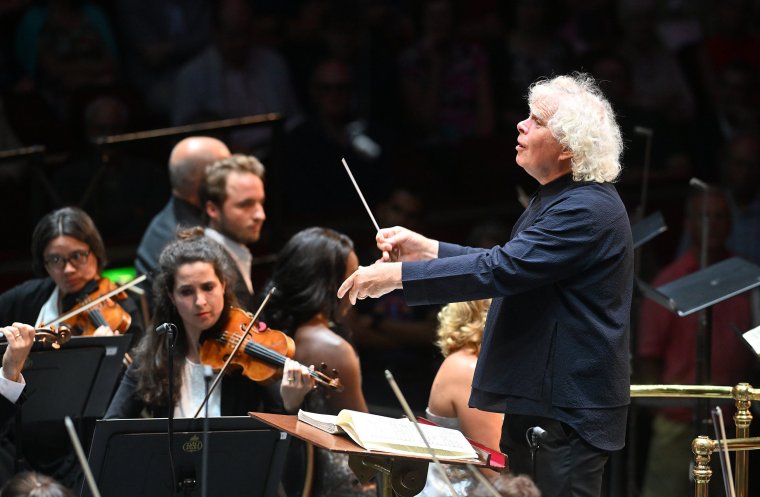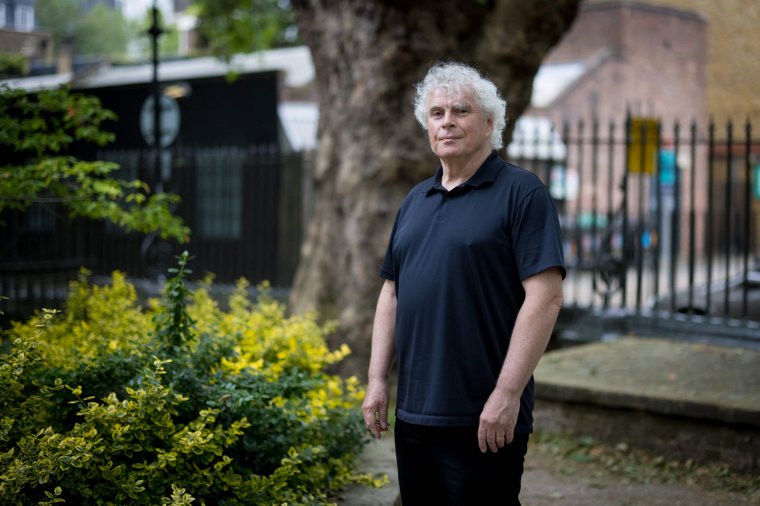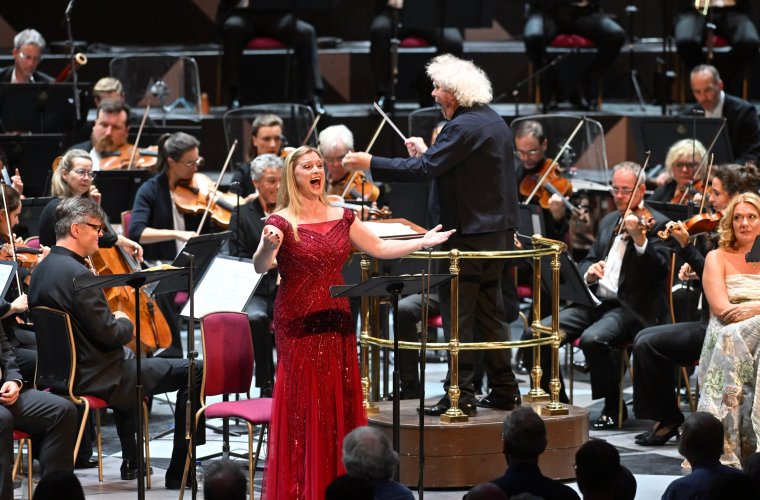Tonight, the London Symphony Orchestra (LSO) and its outgoing principal conductor Sir Simon Rattle give their last Prom as musical spouses. With the valedictory end of Mahler’s Ninth Symphony, what should have been an artistic partnership made in heaven comes to a close, at least in this form.
The story of Rattle and the LSO could be entitled The Land of Might-Have-Been. Although their six years together have brought musical glories and unforgettable moments, the brouhahas in the surrounding cultural climate have led to a saga of opportunities squandered and potential glugged away down many plugholes. Given that Rattle stayed with the City of Birmingham Symphony Orchestra for 18 years and at the Berlin Philharmonic for 16, six seems distinctly limited.
What is so special about Rattle? For a start, he has long served not only as a musical leader, but as a practical and very public figurehead. Now 68, he’s no irascible dictator as a conductor – quite the opposite.
He stands up for his musicians, his colleagues and the wider music industry. Few conductors have been so willing to speak truth to power regarding the urgent issues facing their field. His charismatic warmth helps to give him a special cut-through, making him one of the few household names in British classical music today.
As a musician, he shows an equally broad vision, adaptable and sensitive to different styles from Bach to Betsy Jolas. You can hear in his performances beauty and energy, tragedy and joy, the ineffable and the roof-busting, while generosity on a grand scale permeates the whole.

Starting out as a fresh-faced lad from Liverpool, Rattle cut his musical teeth playing percussion in the Merseyside Youth Orchestra. In the National Youth Orchestra he experienced Pierre Boulez’s conducting, which proved a formative experience. After studying at the Royal Academy of Music, he won the John Player International Conducting Competition aged only 19, going on to hold posts at the Bournemouth Symphony Orchestra, Glyndebourne and the Royal Liverpool Philharmonic.
Then in 1980, the City of Birmingham Symphony Orchestra elected him its principal conductor. The CBSO is unusual in allowing its players to vote in their chief and it has a history of canny appointments – others have included Sakari Oramo, Andris Nelsons and Mirga Gražinytė-Tyla.
Rattle, building his relationship with the orchestra across nearly two decades, cemented its reputation as an international force and spearheaded the creation of Symphony Hall, which acoustically is probably the finest large concert venue in the UK.
Finally, in 1999 there came a call from the Berlin Philharmonic, which also elects its own music director. Rattle was up against stiff competition from Daniel Barenboim, but triumphed in the ballot. Few conductors would turn down the mighty Berliners. At Rattle’s disposal now was the magnificent orchestra that had once been Herbert von Karajan’s, retaining the imprint of that conductor’s high-calorie string sound, its flawless woodwind and sonorous, refulgent brass.
Not that it was all smooth sailing (no orchestra and conductor relationship ever is). Some detractors grumbled about Rattle’s unconventional repertoire choices, and even about his outreach initiatives, which included a community dance project on Stravinsky’s The Rite of Spring. Under his tenure the orchestra established an education department for the first time.

All of this nevertheless proved its worth and was complemented by a battalion of superb recordings. Moreover, Rattle’s persuasiveness helped to win his orchestral musicians a significant pay rise. But when news that he would be stepping down after 16 years came just when the LSO needed a new figurehead, British fans quickly read the runes.
The LSO had undergone a turbulent period under the principal conductorship of Valery Gergiev. His music-making inspired excitement, but also frustration over the limited rehearsal time amid his jam-packed personal schedule; it was easy to feel that the LSO was playing second fiddle to his Mariinsky Theatre, St Petersburg. Gergiev’s brand was tarnished in the 2013-14 season when, following Russia’s introduction of anti-gay legislation, his alleged closeness to Vladimir Putin’s regime led to protests around his concerts in London and New York.
Rattle’s arrival in 2017, following his appointment two years earlier, seemed a national triumph. Here was the leading British conductor of his generation returning to his home country to head a top London orchestra at last. Under his direction, the LSO’s sound has gained subtlety and transparency, and gelled back into the great ensemble it deserves to be.

One thing was still missing: a state-of-the-art venue. A new hall was envisioned for the old site of the Museum of London: the Centre for Music, with an idealistic, inclusive outlook reflected in the design. Rattle’s dislike of the concrete-bunker Barbican’s ungainly acoustic was well known (and justified; a poor acoustic in a concert hall is like lousy lighting in an art gallery). While his agreement did not rest on the plan, it could well have been an added incentive for him.
The stars, however, failed to align. Uncertainty following the 2016 Brexit referendum, allegations of “institutional racism” at the arts centre, the resignation of the Barbican’s longstanding managing director, Sir Nicholas Kenyon – a major force behind the Centre for Music – and snarl-ups behind the museum’s mooted move to Smithfield Market, all conspired against it. And of course the pandemic forced the cancellation of live performances for months, leading to financial peril across the arts world. Today, the UK is busy slashing its arts investment to the bone.
So much for the British stick; but some juicy German carrots would also tempt Rattle back to a country where the arts budget for Berlin alone is greater than that for the entire UK. The Bavarian Radio Orchestra’s beloved music director, Mariss Jansons, died in 2019. The resulting vacancy was as irresistible as the Berlin Philharmonic: Rattle got the job and is off to Munich.
There’s no way we can pretend that losing him so soon has nothing to do with Brexit. He has said in interviews that he would have been “extraordinarily wary” of taking the LSO post had he anticipated it. He still lives in Berlin with his wife, the mezzo-soprano Magdalena Kožená, and their children, and he has applied for German citizenship.
He has decried the avalanche of post-Brexit red tape that now blights UK musicians’ working lives, and there’s little prospect of that damage easing: a report just the other day from the Independent Society of Musicians reveals that a quarter of workers in the UK music industry have lost all their EU-based employment because of Brexit. Given the spiteful, bullying, anti-cultural attitude that is poisoning the national atmosphere, I wouldn’t blame anybody for wanting to leave.
Rattle retains a lifetime role as the LSO’s Conductor Emeritus; he will be back often. Symbolically, though, his departure is a sad moment: any fancy dreams of great British conductor, great British orchestra and great British concert hall are probably gone for good. The wider implications appear destructive to whatever remains of the UK’s international “soft power”.
And yet… all is not lost. At the LSO, there’s a silver lining. A new principal conductor, Sir Antonio Pappano, hitherto the longstanding music director of London’s Royal Opera House, takes up the post next year. His thrilling performance with the orchestra of Strauss’s Ein Heldenleben (A Hero’s Life) in February seemed to promise much great music-making ahead. I for one am looking forward to it.



